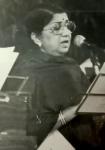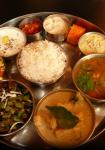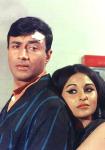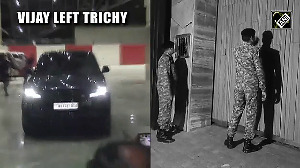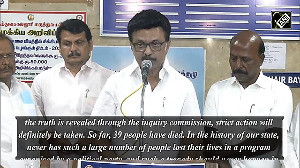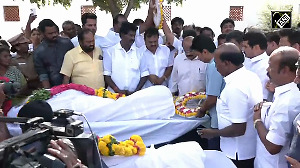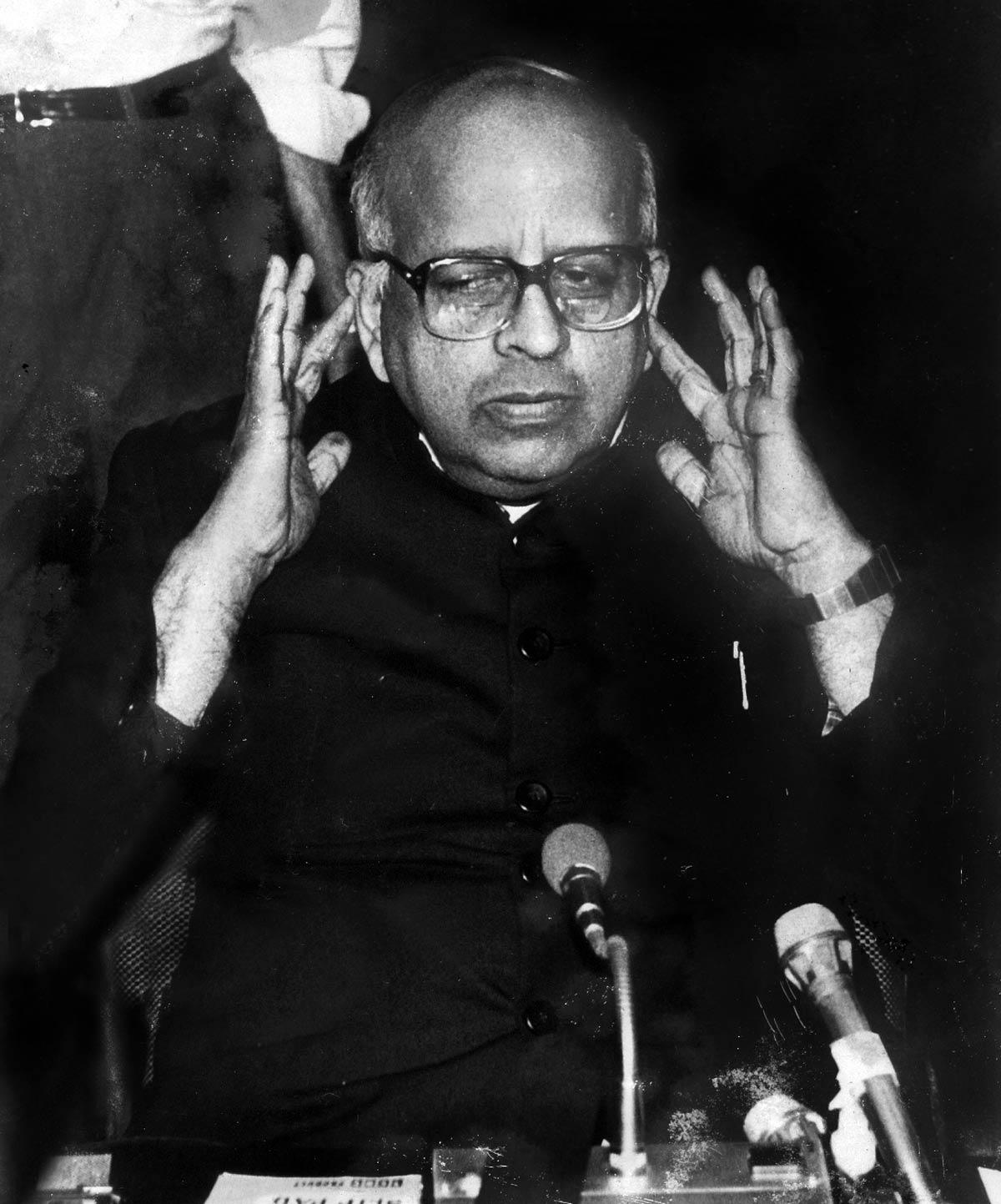
Politicians and leaders are a reflection of the society, says former chief election commissioner T N Seshan on the quality of India's polity, in the final part of his interview with Shobha Warrier.
Part I: 'There is reason to be less cynical today'
Part II: 'Reservation is a storm in a teacup'
Part III: 'Americans think democracy is like giving a lollipop'
We say we are the largest democracy in the world but we sometimes elect individuals with a criminal background...
Yes, yes. I am not justifying anything. In a room of 10 people, if all are tainted, and we are asked to select one, the man selected will also be tainted. They are representative.
Does that mean there is something wrong with our society?
There is a lot of crime around. There is so much of cheating, so much of corruption, so much of various wrong things. So when an election takes place, one of them gets elected. Naturally, it is a tainted person.
Does that mean we don't have to worry about the deterioration in standards that we witness in the legislatures?
If you raise the quality of the base, the quality of the top also will rise.
So, in your opinion, our democracy works and has worked?
Yes, it has worked. It still works. And it could work much better. Yes, you feel sad about the way it works sometimes. But there is no reason to be despondent.
In 1998 you told me that journalism is junk, the bureaucracy is junk. Today, has the junk worsened or become better?
One of the sad features is that it has worsened. Things like journalism and the bureaucracy have not improved. Whatever be the reason, journalism has become completely, completely yellow. Most journalism has no time for intellectual in-depth analysis of what is happening.
Take any issue, take the women's issue, take the reservation issue, take the office of profit issue, nobody has the time and inclination to sit down and analyse it in depth.
As far as the bureaucracy is concerned, it is becoming more and more and more servile. It will require administrative improvement of tremendous variety which all well-meaning people have tried and failed. I think the present prime minister is trying very hard to improve the administration but it is not easy.
How do you rate Dr Manmohan Singh as prime minister?
Given the circumstances, he is doing extraordinarily well. It is not a majority government; it stands with the support of people inside and outside. The vote-pulling characteristic of the party was Sonia Gandhi.
She is said to be pulling the strings.
What strings is she pulling? It is journalistic junk to say she is pulling the strings. Yes, she expresses her opinion forcefully and forthrightly. She is supposed to. She has a certain status, which is usually not clear to the people.
Manmohan Singh walked into the prime ministership fully aware of all that.
You saw her when Rajiv Gandhi was prime minister. Did she show any leadership quality then?
No, she was not called upon to show any leadership quality then. She was in the shadow of her husband from where she never came out. She was only a housewife looking after her husband and children.
Why did the Congress go back to the family and bring back dynastic rule?
If that was the focus over which they could reach a compromise, why not?
Are you saying there is nothing wrong in the dynasty continuing and Rahul Gandhi becoming the leader and maybe the prime minister too?
If the Congress party cannot find a better leader, why not Rahul Gandhi? Why not Priyanka Gandhi? If people elect them, why not?
Eight years ago, we spoke about lack of leadership in all spheres of life. Today, young Indians -- school and college students -- admire President A P J Abdul Kalam.
Abdul Kalam cannot be a youth leader because he is seventy-something old. But he has displayed himself as the President of India very well. He is friends with the young people, and thousands of them admire him. He is informal.
His brain is working all the time. He doesn't go to a function and make some flippant speech. Wherever he goes, he prepares himself and makes suggestions through his Powerpoint presentations.
The young people are looking for leadership wherever they can, and since they are not finding it anywhere else, they look up to Mr Kalam.
You left behind a legacy as chief election commissioner. Are you happy with the way your successors have carried out the election process?
I was succeeded by (M S) Gill. Gill was succeeded by (J M) Lyngdoh. After that, it was (T S) Krishnamurthy. He was succeeded by (B B) Tandon and now by (N) Gopalaswamy. Have they carried out things? Each person's methodology is different; the circumstances are different. I don't think they did very badly. Yes, they could have done better.
On some occasions, they were only making grumbling noises. Instead, they could have taken decisive action. When the Bihar elections got damaged, Mr Tandon should have cancelled the elections. He did not. But sitting a thousand miles away, I can only do second-guessing. He must have had the full facts with him.
The Election Commission is not like what it was before my time. The Election Commission is not as obstreperous as it used to be when I was there. Newspapers used to rouse me and I used to give them back.
Any improvement you can suggest in conducting elections?
The basic improvement one can suggest is, modify, control, and regulate the use of money. The only answer to that is State funding of elections. Nothing else will satisfy.
The second one is to have a fool-proof law which prevents criminals and people of bad character (from) getting into Parliament and the assemblies.
India has hostile neighbours. What is wrong with us and our foreign policy?
We are trying to tell the world what is right and what is wrong. Such a person is never liked. If you tell your brother, sister or cousins, 'You are doing something wrong,' they will not be happy with you. This is the price you pay for being right and outspoken.
Take Sri Lanka. We tell the Tamils, 'You can't get a separate Tamil State.' We tell the Sinhalese, 'You can't suppress the Tamils.' So, both sides are our enemies.
We are telling the people of Nepal, 'Don't kill the king.' We are telling the Maoists, 'Don't murder the people.' Neither side is happy with us.
To be a good man in town, you will be disliked.
Does that mean in today's world, we have to be hypocrites?
Why should we?
Because we have hostile neighbours.
Why should it bother us? If it is because of something you do, then you have to change yourself. (If) they are hostile because you are straightforward and frank, then you have reason to be proud. You don't have any reason to be worried.
We have problems in many parts of India; in the northeast, in Srinagar, Telengana. Even states are fighting for areas. For example, the bone of contention between Maharashtra and Karnataka is Belgaum. Will India as a nation wither away?
We are a democracy of only sixty years. What you see is only the froth on the surface. Nothing will break the country.
I will tell you something, bad news is news and good news is not news. Good news does not appear anywhere; only little trouble in the northeast will be news.
How would you describe the last 59 years of India?
India has done well. Today you don't feel angry when the tourism department advertises 'Incredible India.' We are incredible.
But when the BJP campaigned with the India Shining slogan, they lost the elections.
That was because the poor people were not carried away by IT (information technology) shining. What they want is their next meal. So, they must have thought, 'You are making too much noise about what other people have achieved. So, go away.'
So, a long way to go for India to shine?
Yes, we are not shining. We have a long way to go. As I said in the beginning, we are 60, 70 per cent in the right direction.
Has your opinion about politicians changed?
Nothing has changed. It has neither deteriorated nor improved.
Which Indian politician do you admire the most?
Nehru, Sardar Patel, Rajaji, Kamaraj.
All of them belong to the time India just became independent. You can't name anybody who came after them?
You tell the names. I will give my opinion.
Vajpayee?
Certainly. Why not?
Rajiv Gandhi?
Very good but very naive. Did not understand how to protect himself.
Dr Manmohan Singh?
Not yet fully displayed qualities of decisive leadership.
Who was the worst politician you met in your career?
There are so many candidates. But (P V) Narasimha Rao was the most devious person I met.
In those days, you used to end your columns in The Week with: 'Cry my beloved country.' How would you have ended if you were to write today?
Incredible India!
